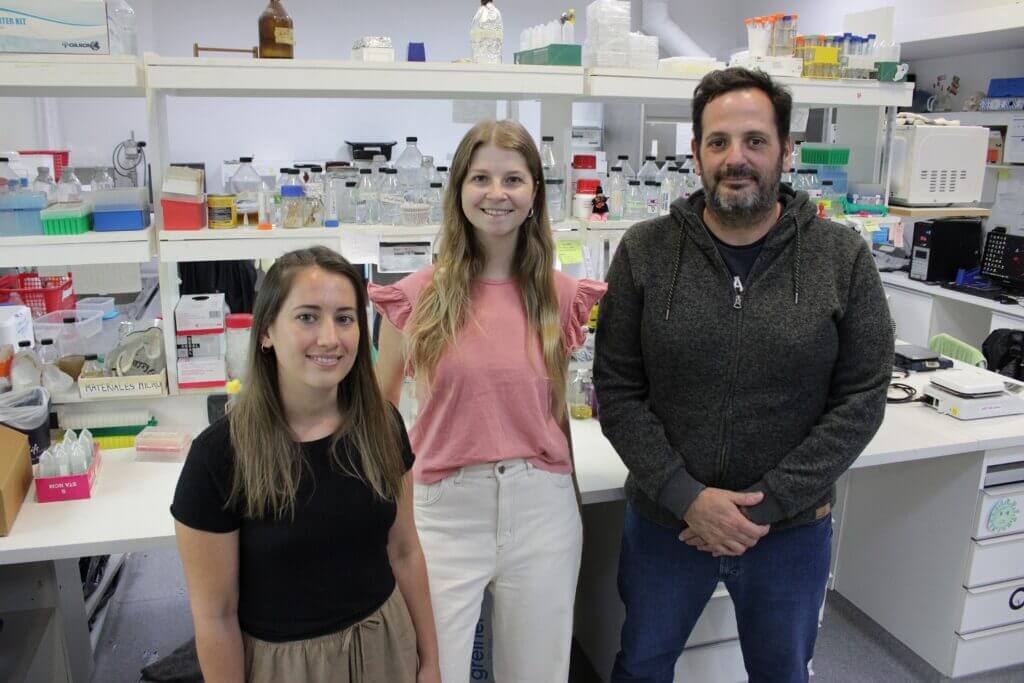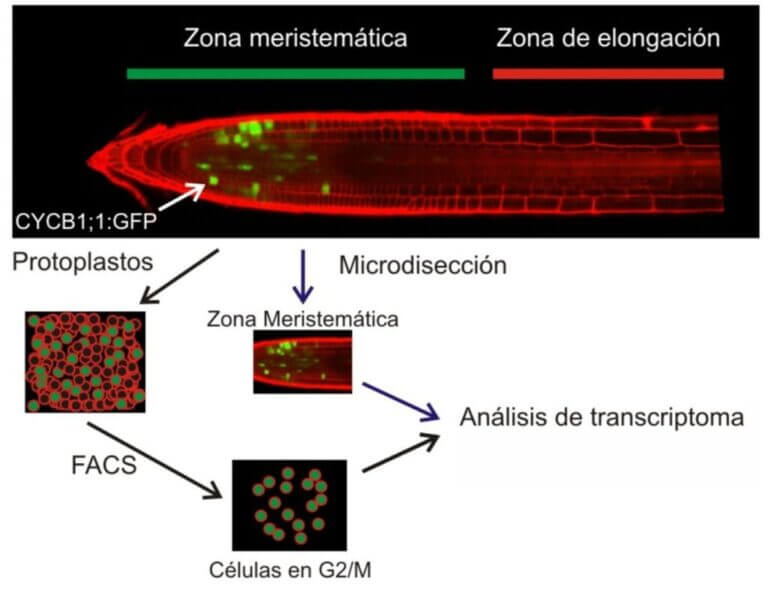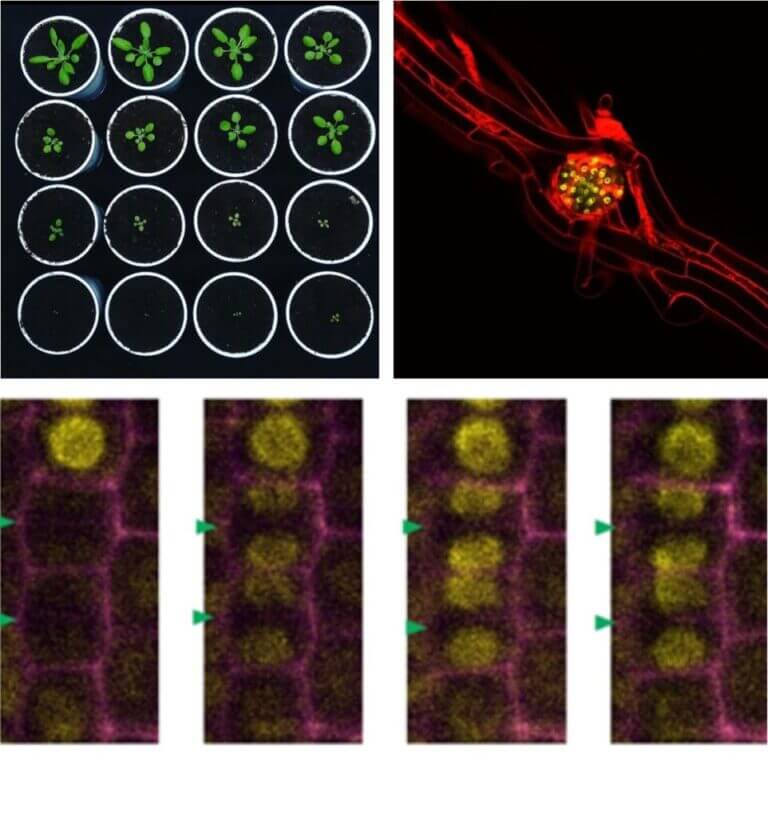research groups
Cell Biology of Plant Development
summary

- Rodriguez, Ramiro Location: CCT
Email: rrodriguez@ibr-conicet.gov.ar
- Barrera, Virginia
- López Alsina, Mercedes
RESEARCH LINES
Mechanisms that modulate the growth of plant organs by controlling cell proliferation
There are important similarities in the mechanism of growth of all plant organs. Once the different cell types are established by the stem cells, cells go through a stage of active cell proliferation in which new cells are produced by mitosis. These cells then go through a phase of expansion and differentiation until they reach the mature functional state. The final size of each organ depends on the number of cells produced by the meristems and the size the cells acquire after the expansion period.
The new cells are produced by mitosis in the meristematic zones of developing organs. Therefore, controlling progression through the Mitotic Cell Cycle (MCC) phases is critical in determining the magnitude of plant organ growth. The genetic mechanisms that control the parameters that define the magnitude of cell production regulate the size and persistence over time of the proliferation zone, and others, the rate of the cell cycle at which cells in this zone divide. In this line of research, we aim to identify and characterize regulatory modules that control the cell cycle in plants at the transcriptional and post-transcriptional level and promote their development and growth, with the ultimate goal of generating tools that allow increasing crop yields to improve food and biofuel production and the adaptation of plants to the environment.
Endoreplication and cell expansion in plants: mechanisms, regulation and function
At the cellular level, the development and growth of all plant organs is based on a common general scheme. After the different cell types are established by formative divisions of stem cells, a stage of cell proliferation occurs in which cells perform the Mitotic Cell Cycle (MCC) to amplify in number. These new cells, initially small and with limited differentiation, begin a period of cell expansion. In this second stage, plant cells usually perform a variety of the cell cycle called Endoreplication (ER), which consists of DNA replication without subsequent mitosis and cytokinesis, generating cells with higher somatic polyploidy, i.e, chromatin content.
As a working hypothesis, we propose that there are multiple mechanisms at the transcriptional and post-transcriptional level in plants that control the transition from the MCC to ER. This occurs both during normal development as well as part of the developmental plasticity mechanisms that plants deploy in response to the environment. Of these mechanisms, some have only been partially characterized and some have yet to be identified. We also propose that the functions of somatic polyploidy generated by ER go beyond promoting cell expansion and that there are still functions that are not fully established and characterized yet.
In this line of research, we aim to study the mechanisms that control ER in plants. In addition, we propose to analyze how the somatic polyploidy generated by this process contributes to the development of different plant organs and the interaction of plants with the environment. We propose to study regulatory networks of transcription factors (TF) that control the transition from MCC to RD and to determine the function of somatic polyploidy in plants by analyzing in detail at the cellular, biochemical, and physiological level plants with modifications in these regulatory pathways.
X: @ramrodri
Images of our research lines


PUBLICATIONS AND PATENTS
SCARECROW-LIKE28 modulates organ growth in Arabidopsis by controlling mitotic cell cycle exit, endoreplication, and cell expansion dynamics.
SCARECROW-LIKE28 modulates organ growth in Arabidopsis by controlling mitotic cell cycle exit, endoreplication, and cell expansion dynamics.
The Arabidopsis GRAS-type SCL28 transcription factor controls the mitotic cell cycle and division plane orientation.
The Arabidopsis GRAS-type SCL28 transcription factor controls the mitotic cell cycle and division plane orientation.
Robust increase of leaf size by Arabidopsis thaliana GRF3-like transcription factors under different growth conditions.
Robust increase of leaf size by Arabidopsis thaliana GRF3-like transcription factors under different growth conditions.
GIF Transcriptional Coregulators Control Root Meristem Homeostasis.
GIF Transcriptional Coregulators Control Root Meristem Homeostasis.
Control of cell proliferation and elongation by miR396.
Control of cell proliferation and elongation by miR396.
Sede CCT Rosario
Ocampo y Esmeralda, Predio CONICET-Rosario
2000 Rosario, Santa Fe, Argentina
Tel. 54-341-4237070 / 4237500 / 4237200
Sede Facultad de Ciencias Bioquímicas y Farmacéuticas
Universidad Nacional de Rosario - Suipacha 531
2000 Rosario, Santa Fe, Argentina
Tel. +54 341 4350596 / 4350661 / 4351235
🔬 El IBR suma 9 proyectos seleccionados en Investigación Orientada 2025 de @ProduccionSF y @CienciaSantaFe.
Biotecnología, salud y sostenibilidad para fortalecer el vínculo entre ciencia, innovación y desarrollo territorial.

